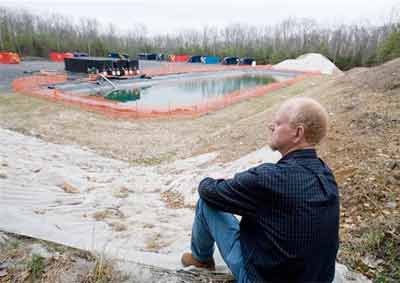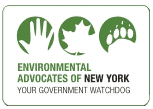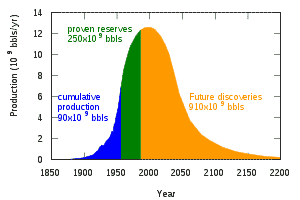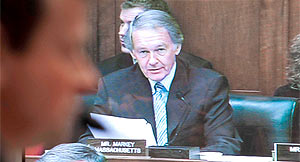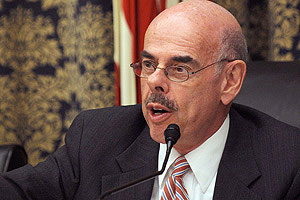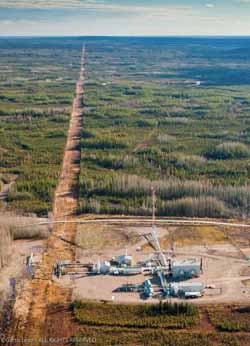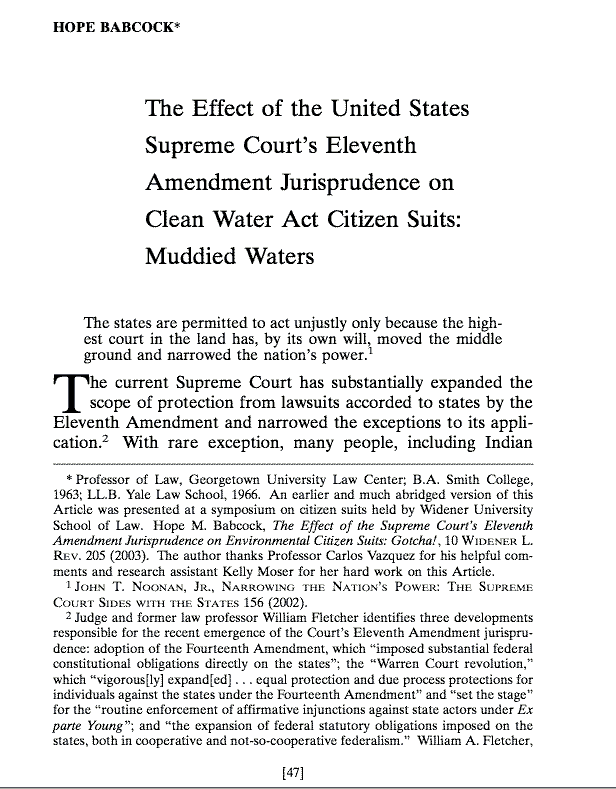Biblio
EIP combines research, reporting, and media outreach to spotlight illegal pollution, expose political intimidation of enforcement staff, and encourage federal and state agencies to take enforcement action to stop these practices. EIP’s work has been cited in Congressional hearings and debates, in reports by the US General Accountability Office, and in frequent news articles.
...no other organization is so sharply focused on the vigilant enforcement of environmental laws.
See: Gasland - The Debate
NEW ORLEANS, Louisiana, August 30, 2010 (ENS) - Two environmental groups Friday filed a motion to intervene in the lawsuit brought by Texas Attorney General Greg Abbott and the State of Texas against the U.S. Environmental Protection Agency regarding the EPA's June 2010 disapproval of part of Texas' air permitting program.
Environmental Defense Fund and Environmental Integrity Project filed the motion in the U.S. Court of Appeals for the 5th Circuit in New Orleans.
The environmental groups are seeking to intervene on the side of the EPA. If they are allowed to intervene, they will argue that the agency properly disapproved the Texas Flexible Air Permitting program.
"Governor [Rick] Perry wants people to think that Washington is picking on him," said EDF energy program director Jim Marston. "The truth is he wants Texas to get a special pollution pass that no other state gets."
"All other 49 states follow the Clean Air Act, and it's time that politicians and polluters in Texas follow it, too," Marston said. "Our intent is to make sure this lawsuit considers the facts and science surrounding this issue and that re-election campaigns aren't waged in the courtroom."
See Molly Ivins. Bushwhacked: Life in George W. Bush's America
See: Ramon Alvarez. April 16, 2010. "Barnett Shale gas producers caught with their hands in the cookie jar".
"Natural gas producers should not impede the city’s efforts to better characterize their industry's air pollution. After all, if industry’s claims are true that the natural gas production in Fort Worth does not produce harmful emissions, then they should have nothing to fear from a thorough and independent city-sponsored study."
An Uncommon Approach: Four Core Strategies
Founded in 1967 as the Environmental Defense Fund, we tackle the most serious environmental problems with:
See our history of results.
Photo By Kalim A. Bhatti, for USA Today. 4/28/2010.
Bob Myers, an avid hiker, in Lock Haven, Pa., has become concerned that state forests are being freely leased to drilling firms, leading to clear-cutting of forests, sludge pits and risks of accidents.There have been many incidents of water contamination and even buildings exploding because of natural gas hydro-fracturing operations. The most common problem is methane migration due to defective casing.
According to the Pittsburgh Geological Society's article "Natural Gas Migration Problems in Western Pennsylvania" methane migration occurs when natural gas escapes "from the reservoir rock, coal seam, pipeline, gas well, or landfill. If the gas migrates through the bedrock and soil, it can result in an explosion capable of damaging property and causing loss of life."
Bob Myers has written an informed overview on the impact and consequences of hydraulic fracturing in Pennsylvania. In the section titled, "The Pennsylvania Natural Gas Industry Wall of Shame", he lists violations and pollution from 2009-2010.
Supporters of the gas industry often claim that we have nothing to fear from the big, reputable companies. But, the incidents listed above were caused by Cabot, Range Resources, Anadarko, Chesapeake, East Resources, Talisman, Fortuna. Who's left?"
Professor Myers received his Ph.D. from Penn State in 1991. He teaches American Literature, and has published a biography of the author Harold Frederic, as well as several articles on late-19th-century literature.
ALBANY, NY (05/04/2011)—The New York Water Rangers, individuals working to protect state waters from dirty gas drilling and hydraulic fracturing, or “fracking,” today thanked the State Assembly’s Environmental Conservation Committee for passing legislation that would close a loophole in state law allowing the gas industry to circumvent requirements for the management and disposal of hazardous waste (A.7013 / S.4616).
The Defining Hazardous Fracking Waste bill would update state law so that any drilling waste that meets the characteristics of hazardous waste is subject to all state regulations related to its generation, transportation, treatment, storage, and disposal.
“Why should the gas industry get a free pass on hazardous fracking waste? If wastewater generated by dirty gas drilling and fracking is hazardous, it must be treated as such in order to protect the health and safety of our communities and our waters.”
The New York Water Rangers are now calling on members of the Assembly Codes Committee to pass the bill without haste and keep it on track.
A new Marist College poll revealed that 41 percent of New Yorkers oppose fracking, and 21 percent aren’t sure where they stand on the issue. We’re committed to educating these undecided New Yorkers, especially the state lawmakers among them.
------------------------------------------------
Environmental Advocates of New York's mission is to protect our air, land, water and wildlife and the health of all New Yorkers. Based in Albany, we monitor state government, evaluate proposed laws, and champion policies and practices that will ensure the responsible stewardship of our shared environment.
We work to support and strengthen the efforts of New York's environmental community and to make our state a national leader.
Lively and informative rural American blog based in Austin Texas. This section contains articles on the Environment.
The Daily Yonder's special reports also bring you overviews of the big issues now facing small communities -- health, employment, broadband access, education, and economic development.
The Daily Yonder brings issues and images of the rural U.S. to the fore. We welcome readers from all over to see what's working, failing or never been tried in small communities.
Dee Davis is president and founder of the Center for Rural Strategies, which publishes the Daily Yonder. He is the former executive producer of Appalshop Films/Headwaters Television. Read more about the staff here.
See: Abrahm Lustgarten. "Natural Gas's Climate Benefits Questioned." Daily Yonder. Jan. 25, 2011.
It was thought natural gas easily beat coal when it came to slowing climate change. The EPA finds that thinking needs a revision.
A logistic distribution shaped production curve, as originally suggested by M. King Hubbert in 1956.
See the U.S. Department of Energy (DOE), International Energy Outlook, for information on energy trends.
The Energy Policy Act of 2005 (Pub.L. 109-58) is a bill passed by the United States Congress on July 29, 2005, and signed into law by President George W. Bush on August 8, 2005, at Sandia National Laboratories in Albuquerque, New Mexico. The act, described by proponents as an attempt to combat growing energy problems, changed US energy policy by providing tax incentives and loan guarantees for energy production of various types.
Criticisms
The Washington Post contended that the spending bill is a broad collection of subsidies for United States energy companies; in particular, the nuclear and oil industries.
..."House Majority Leader Tom DeLay (R-Tex.) also managed to insert at least $500 million in subsidies over a 10-year period -- with the option to double the amount -- for research into deep-water oil and gas drilling, a grant that many lawmakers expect to go to the Texas Energy Center in DeLay's home town of Sugar Land. The bill also includes royalty relief for deep-water drilling projects, a strategy that helped jump-start production in the Gulf during the 1990s..."
Senator Hillary Rodham Clinton made the bill an issue in the 2008 Democratic Primary by criticizing Senator Barack Obama’s two votes supporting the bill, calling it the "Dick Cheney lobbyist energy bill."
This bill exempted fluids used in the natural gas extraction process of Hydraulic fracturing from protections under the Clean Air Act, Safe Drinking Water Act, and CERCLA. The proposed Fracturing Responsibility and Awareness of Chemicals Act would repeal these exemptions.
Please note that information taken from Wikipedia should be verified using other, more reliable sources. It is a good place to start research, but because anyone can edit Wikipedia, we do not recommend using it in research papers or to obtain highly reliable information.
The Energy Policy Act of 2005 (P.L. 109-58), signed by President Bush on August 8, 2005, was the first omnibus energy legislation enacted in more than a decade. Spurred by rising energy prices and growing dependence on foreign oil, the new energy law was shaped by competing concerns about energy security, environmental quality, and economic growth.
The Energy Policy Act encourages production on federal lands through royalty reductions for marginal oil and gas wells on public lands and the outer continental shelf. Provisions are also included to increase access to federal lands by energy projects — such as drilling activities, electric transmission lines, and gas pipelines.
In addition, the law prevents the Environmental Protection Agency (EPA) from regulating hydraulic fracturing to protect drinking water sources.
(For additional information, see CRS Report RL32873, Key Environmental Issues in the Energy Policy Act of 2005, coordinated by Brent D. Yacobucci, and CRS Report RL32262, Selected Legal and Policy Issues Related to Coalbed Methane Development, by Aaron M. Flynn.)
See: CRS Report RL33302.
 "Energy in Depth (EID) is a pro-oil-and-gas drilling industry front group formed by the American Petroleum Institute, the Petroleum Association of America and dozens of additional industry organizations for the purpose of denouncing legislation proposed by Colorado U.S. Rep. Diana DeGette to regulate underground hydraulic fracturing fluids."
"Energy in Depth (EID) is a pro-oil-and-gas drilling industry front group formed by the American Petroleum Institute, the Petroleum Association of America and dozens of additional industry organizations for the purpose of denouncing legislation proposed by Colorado U.S. Rep. Diana DeGette to regulate underground hydraulic fracturing fluids."
"The Center for Media and Democracy (CMD) publishes SourceWatch, this collaborative, specialized encyclopedia of the people, organizations, and issues shaping the public agenda. SourceWatch profiles the activities of front groups, PR spinners, industry-friendly experts, industry-funded organizations, and think tanks trying to manipulate public opinion on behalf of corporations or government. We also highlight key public policies they are trying to affect and provide ways to get involved."
Please note that information taken from Wikis should be verified using other, more reliable sources. It is a good place to start research, but because anyone can edit a Wiki, we do not recommend using it in research papers or to obtain highly reliable information.
Energy in Depth is an oil and natural gas industry informational site.
Since June of 2010, this has been the place to read the rebuttal to Josh Fox's documentary Gasland.
"We’ve spent some time over the past couple months taking a critical look at some of the key assertions made in the HBO documentary Gasland, putting forth in that time two separate rebuttal documents that we believe address in a substantive way a number of the misconceptions upon which the film, and its broader political message, is based.
Read the opposing viewpoints on Energy in Depth as an information source on Sourcewatch Wiki
See: Nora Eisenberg. AlterNet. July 23, 2010. Exposing the Natural Gas Industry's Attempt to Silence Its Critics
Please note that information taken from Wikis should be verified using other, more reliable sources. It is a good place to start research, but because anyone can edit a Wiki, we do not recommend using it in research papers or to obtain highly reliable information.
About Energy in Depth:
"Who We Are: America’s natural gas and oil producers – the majority of which are small, independent businesses with less than 12 employees- are committed to strengthening America through the safe, responsible and environmentally-friendly development of domestic energy resources."
See extensive press-releases and archived press-releases reacting to environmental pressure, presenting the arguments of industry in favor of fracking the Marcelus Shale.
Related:
Lee Fuller. "HF 101: As Cornell Begins Study of Shale Gas Exploration, Energy In Depth Offers Itself Up as Resource for Ad Hoc Panel". Energy in Depth.

Lee Fuller
Mike Hale. The New York Times. June 21, 2010. The Costs of Natural Gas, Including Flaming Water.
Oral Statement Submitted by Mr. Lee Fuller, Representing Independent Petroleum Association of America (IPAA) and Energy In Depth (EID), 3-28-10. (PDF, 3 pp., 46,255 bytes). Submitted to: EPA Scientific Advisory Board (SAB) Environmental Engineer Committee Hydraulic Fracturing Research Plan Review. 4/7/2010- 4/8/2010. The St Regis, 923 16th Street, NW, Washington DC 20006.
See: Drilling Isn't Safe.
There are now two websites for the House Energy and Commerce Committee- one for the Republicans and one for the Democrats. For citizens in the U.S., we are still living a Reaganesque "con", an obvious "tell" that Washington is more broken and redundant than ever.
In the David Mamet film, House of Games | Human Nature is a Sucker Bet (1987), Mike and his men [pulling a con job on Margaret] ...see that the jig is up, and nonchalantly pack up the con. Mike apologizes, saying it was “only business … nothing personal.” Margaret puts the pieces together. She spies on the con men--among whom is the "dead" cop/mark--and confirms that everything was a ruse to swindle her out of $80,000...
...Margaret pulls out her gun and dares Mike to beg for his life. He refuses and she shoots him repeatedly until he dies.
Much later, we see that Margaret has gone on with her life, a changed woman, now able to "forgive herself." She shows no sign of guilt or remorse for murdering Mike. She steals a gold lighter out of the purse of another woman in a restaurant and relishes the acquisition.
The energy business and its minions are fighting an undeclared war on the EPA, The Clean Water Act and public saftey. We are all being dragged into this con job. Their argument: the Clean Water Act does not directly address groundwater contamination. Groundwater protection provisions are included in the Safe Drinking Water Act, Resource Conservation and Recovery Act and the Superfund act.
Sounds redundant to me... just give me a cool drink of water 'fore i diiie. (Neil Zusman, 2011-02-02.)
Angelou chose "Just Give Me a Cool Drink of Water 'fore I Diiie" as the book's title because of her interest in "unconscious innocence," which she says is "even lovelier than trying to remain innocent." The title is a reference to her belief that "we as individuals ... are still so innocent that we think if we asked our murderer just before he puts the final wrench upon the throat, 'Would you please give me a cool drink of water?' and he would do so."Angelou has said that, if she "didn't believe that, [she] wouldn't get up in the morning." (Angelou, Maya; Elliot, Jeffrey M. (1989), Conversations with Maya Angelou, University Press of Mississippi, ISBN 0-87805-361-1.)
Update February 2, 2011
See: Andrew Schenkel. "Fracking finger-pointing starts as drinking water violations roll in." Mother Nature Network. 2011-02-01.
A report linking the fracking industry to violations of the Safe Drinking water Act is putting the biggest names in the fracking industry on the defensive. Democrats in the House Energy and Commerce Committee released a report on Monday (2011-01-31) that claims 12 companies in several states dumped more than 30 million gallons of diesel fuel as part of a scheme to extract natural gas from underground space.
See: Tom Zeller Jr. "Diesel Use in Gas Drilling Cited as Violation of Safe-Water Law." NYT. 2011-02-01.
No permits for diesel-based fracking have been sought or granted since the Safe Drinking Water Act was amended in 2005.
Lee Fuller, a vice president for government relations with the Independent Petroleum Association of America, said that was because the E.P.A. had never followed up by creating rules and procedures for obtaining such permits and submitting them for public comment.
The agency did quietly update its Web site last summer with language suggesting that fracking with diesel was, indeed, covered as part of the underground injection program, which would suggest that permits should have been obtained. But Mr. Fuller’s organization, along with the U.S. Oil and Gas Association, has gone to court to challenge the Web posting, arguing that it amounted to new rule-making that circumvented administrative requirements for notice and public commentary.
Thursday, February 18, 2010. "Chairman Henry A. Waxman and Subcommittee Chairman Edward Markey today sent letters to eight oil and gas companies that use hydraulic fracturing to extract oil and natural gas from unconventional sources in the United States. The Committee is requesting information on the chemicals used in fracturing fluids and the potential impact of the practice on the environment and human health."
As Chairman of the Committee on Oversight and Government Reform in the last Congress, Rep. Waxman requested and received information from the largest hydraulic fracturing companies - Halliburton, BJ Services, and Schlumberger - on the chemicals used in their fracturing fluids.
According to this data, two of these companies used diesel fuel in their fracturing fluids between 2005 and 2007, potentially violating a voluntary agreement with EPA to cease using diesel. Halliburton reported using more than 807,000 gallons of seven diesel-based fluids. BJ Services reported using 2,500 gallons of diesel-based fluids in several fracturing jobs. Halliburton and BJ Services also indicated that they used other chemicals - such as benzene, toluene, ethylbenzene, and xylene - that could pose environmental risks in their fracturing fluids.
Today Chairmen Waxman and Markey sent letters seeking additional information from Halliburton, BJ Services, and Schlumberger on these and related issues. The Chairmen requested similar information from five smaller fracturing companies that comprise a growing share of the market: Frac Tech Services, Superior Well Services, Universal Well Services, Sanjel Corporation, and Calfrac Well Services. In addition, the Chairmen sent a memo to Members of the Subcommittee on Energy and Environment detailing the background on the issue, including EPA's recent work on hydraulic fracturing, the Committee on Oversight and Government Reform's investigative findings, and the need for additional oversight and investigation."
Documents included: Examining the Potential Impact of Hydraulic Fracturing, Feburary 18, 2010
Letter to Andrew Gould
Letter to Roger Willis
Letter to David J. Lesar
Letter to Douglas R. Ramsay
Letter to Darin MacDonald
Letter to J.W. Stewart
Letter to Dan Wilks
Letter to David E. Wallace
See: Sabrina Shankman. "Congress Launches Investigation Into Gas Drilling Practices." ProPublica. 2010-02-19.
See: Abrahm Lustgarten. "Clearing the Air on ProPublica’s Drilling Pollution Story." ProPublica. 2011-01-31
See: Candice O'Grady. "Newsweek Greenwashes the Oil Lobby for Real." FAIR. Feb. 2010.
See: Committee Democrats Release New Report Detailing Hydraulic Fracturing Products
See: House committee votes to deny climate change
See: Action Center | Republicans for Environmental Protection (REP America)
The sweet irony of this video - some things, like fracking, are best expressed with a cake!
A recent company event provided an opportunity for one of our engineers to educate children about natural gas development. Parents and educators often ask us for industry material to use with this audience so we made this video in the spirit of creativity.
What do 11 tubs of icing, more than two dozen cookies and 115 cupcakes have to do with natural gas? A lot, actually, once sculpted into a layer cake that uniquely demonstrates how the clean energy choice is extracted in our operations.
See: Encana | Mixplex.
See: Spectra Energy's "Kids Say [the] Darndest Things About Natural Gas".
Spectra Energy Watch said, "When gas companies send children to defend the industry, it is a sign of desperation."
Spectra Energy’s latest 3-minute PR effort in the form of a kiddie video includes a touch of irony. It begins with the kids comparing natural gas to farts, when asked, “What is natural gas?”.
The video has been removed by Spectra Energy. We saw it.
Twenty-three days after EnCana completed hydraulic fracturing operations on the F11E, the liner is removed, some of the sludge is pumped out and the remainder - perhaps 70 barrels or more - is dozed in.
For over a year, at Journey of the Forsaken., I've been documenting EnCana's aggressive and irresponsible development of 60 natural gas wells around our home and the infamous area of the 2004 West Divide Creek natural gas blowout.
Lisa Bracken. 2009.
"If one of the pumper trucks had overturned on the county road, spilling this stuff into the environment, a hazardous materials unit would have responded, sequestered the area, potentially evacuated citizens and employed measures to safeguard first responders, citizens and the environment.
But because this is a hydraulic fracturing waste pit, out of sight of the public and on private land (owned, coincidently, by EnCana) it is simply covered up."
See: Lisa Bracken. Journey of the Forsaken.
Among the largest natural gas companies in North America, based in Calgary, Alberta.
The Michigan Land Use Institute reported that In 2006 the Colorado Oil and Gas Conservation Commission fined Encana $370,000 for flawed drilling practices. Residents said the drilling contaminated Divide Creek with methane and benzene.
Alan Boras, Encana’s spokesman, said in an interview that the leak was “a rare circumstance” caused by flaws in the cement that holds the well casing in place.
“Within less than a week of being alerted, the problem was rectified,” Mr. Boras said.
Lisa Bracken, on Journey of the Forsaken, reported on June 30, 2010 that,
"EnCana has recently submitted twenty well permits (with at least twenty more on the horizon) to infill drill in our neighborhood... despite 1) low natural gas prices, despite 2) EnCana suing the state of Colorado over new public safety rules (which are by the way utterly toothless) and which they say are driving them from Colorado; and, 3) despite the persistent, increasing and largely un-investigated presence of leaking hydrocarbon toxins into groundwater and private water wells.
Why the renewed surge in activity? Could be because China is dumping investment dollars into EnCana's bank account to facilitate extraction of gas for export to China?"
See: Natural gas: the commodity world’s ‘ugly duckling’.
See Lisa Bracken video.
See: Lisa Bracken Website: Journey of the Forsaken.
See: Will Koop. Encana's Cabin Not So Homey: Cumulative Environmental Effects - An Unfolding and Emerging Crisis in Northeastern British Columbis'a Shale Gas Plays. (PDF 13. 4 MB, 58 pp.). November 9, 2010.
An Introductory Journey Into BC's Dirty Domino Zone - Commentary and Recent Photos by Garth Lenz.
See: Letter written to Vancouver Sun by Fort Nelson First Nation Chief, Kathie Dickie. Dec. 22, 2009. (Koop, p. 21)
Calgary-based EnCana Corporation, Canada's largest gas producer, along with a consortium of seven other oil companies, is planning to build the biggest gas processing plant in North America in the heart of our 1910 treaty territory.
We've been told many things by the B. C government as we've tried to participate in the environmental assessment process. One official said that because our 100-year-old treaty doesn't specifically address clean air, we have no say on clean air when it comes to the construction of the biggest greenhouse gas creator in B.C. Imagine being told by a government official in 2009 that you have no say on the quality of air you or your children breathe! What parent would stand for it?
We understand the value to the province of shale gas development in the Horn River Basin. But such economic development, whether for our community or yours, should not come at the expense of a gutting of the land, water, and air where a community lives.
We are the only Treaty 8 Nation that lives within the Horn River Basin, and this gas plant, designed to open the basin to drilling, pipelines and gas development, will have an immense effect on our rights and interests. Without the capacity to determine and plan for this development, the survival of the Fort Nelson First Nation is in jeopardy. This plant and the development that it brings must not mean the end of us.
Source: Fort Nelson First Nation Chief, Kathie Dickie, Vancouver Sun, December 22, 2009, Premier’s climate-change hypocrisy could doom first nation’s way of life.
See: Julie Green. "The Game Changer." UpHere Business. June 2010.
...In mid-April, Dickie signed an agreement with Spectra. “It’s more than an impact-benefit agreement,” says Spectra’s Duane Rae. “It formalizes the relationship we already have and talks about how we’re going to continue working together.” The band is working on similar agreements with TransCanada and EnCana. Dickie has a list of substantial fears about shale development and water is at the top.
According to the website, Endangered Environmental Laws, "...over time, courts have transformed [the Eleventh Amendment] into a sweeping doctrine of state “sovereign immunity,” unmoored from the Constitution’s text, and in recent years, a conservative bloc of the Supreme Court has further expanded states’ immunity from private lawsuits.
In the environmental context, this has led to near-total immunity of state agencies from citizen suits under the federal coal-mining statute; to similar challenges (so far unsuccessful) to citizen litigation under the Clean Air Act and the Endangered Species Act; and to dismissal of state employees’ whistleblower complaints under the Solid Waste Disposal Act and other laws."
"The states are permitted to act unjustly only because the highest court in the land has, by its own will, moved the middle ground and narrowed the nation's power.
With rare exception, many people, including Indian tribes, federal employees, patent holders, the elderly, and the disabled, find themselves unable to vindicate rights granted by federal laws in any court when the defendant is a state or a state agency."
Babcock, H. “Effect of the United States Supreme Court's Eleventh Amendment Jurisprudence on Clean Water Act Citizen Suits: Muddied Waters, The.” Oregon Law Review 83 (2004): 47.
See: Rulings Restrict Clean Water Act, Foiling E.P.A.
See: Activists Block Entrance to DEP Headquarters, Condemn Failed Enforcement










